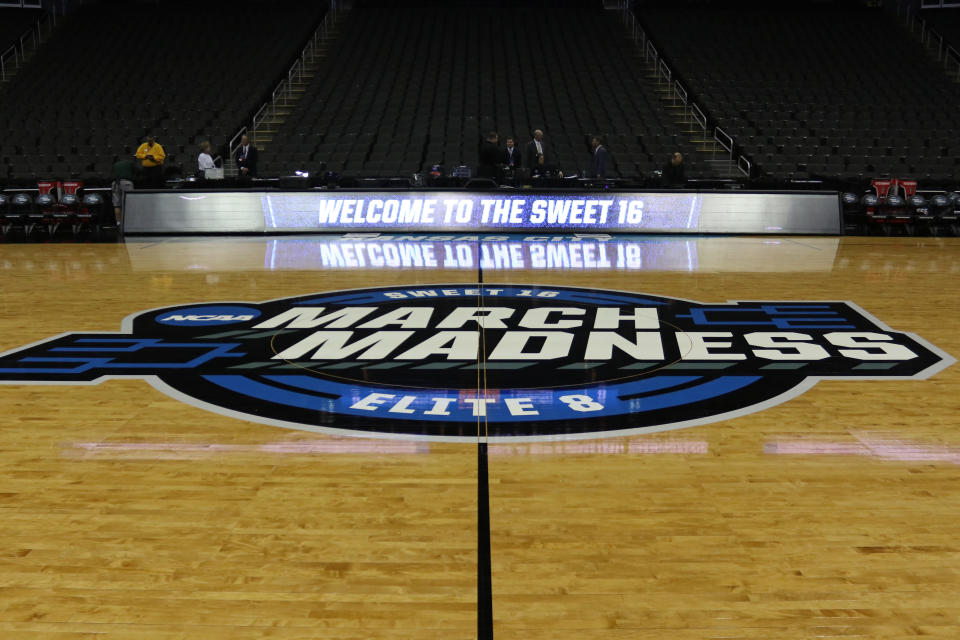Could coronavirus outbreak force NCAA tournament to be played without fans?
The Ivy League canceled its men’s and women’s basketball tournaments scheduled for this weekend, citing concerns over the coronavirus. The Mid-American and Big West conferences will stage theirs with no fans in attendance.
Could bigger tournaments, including March Madness itself, be next?
While numerous college sports officials and insiders thought that, barring a significant increase in the infection rates and danger of the virus, such a move was highly unlikely, the situation is clearly fluid. A more likely step would be to stage the sprawling, 14-location, 12-state, multi-week tournament in stadiums free of fans.
In a statement Tuesday afternoon, the NCAA didn't commit to anything.
"The NCAA continues to assess how COVID-19 impacts the conduct of our tournaments and events," the statement read. "We are consulting with public health officials and our COVID-19 advisory panel, who are leading experts in epidemiology and public health, and will make decisions in the coming days."
Most athletic directors who discussed the issue with Yahoo Sports expected the tournament to happen.
“It’s full speed ahead right now,” said one SEC athletic director. “Unless cases quadruple and there is just too much pressure on the NCAA, I can’t see that changing. If you do a good job washing your hands and taking precautions, then the chances of spreading the virus are thin.”

They cautioned, however, that there is one factor that could change everything … and it’s not just the will or want of the NCAA to have the games played.
It’s not even the coronavirus itself.
It’s lawsuits over the coronavirus.
“You have to consider any possible lawsuit by an athlete or coach who was required to attend, but got very sick,” said one ACC athletic director.
“That’s the world we live in these days,” echoed an SEC athletic director. “I just heard someone got off the Princess Cruise in California and already sued somebody. They want to blame someone. [A lawsuit] would be something that had to be considered.”
The concern is that by having teams play, athletes on scholarship and coaches under contract would essentially be forced to travel for work and then compete in close vicinity with others (the players, mostly). Even if there were no fans in the arena, the players breathing and sweating on each other could heighten the risk of infection.
If someone gets extremely sick, or worse, then is there liability? What if it is a player who was headed toward the NBA and couldn’t properly prepare for the draft and potentially lost future income? Or never play again?
Would that be unlikely? Probably, but it’s certainly possible. Could there be enough lawsuits that it would matter? Could this be a class-action suit? The NCAA and all of its schools have a lot of money.
Could a waiver to participate that acknowledges the risks of the coronavirus take care of this? Or would players who sign it be able to claim later that it was signed under pressure from their coach?
Officially, the NCAA says tournaments in all sports remain on schedule but it is monitoring the situation. “We will make decisions on our events based on the best, most current public health guidance available,” president Mark Emmert said in a statement.
The NCAA’s chief medical officer, Brian Hainline, told the Wall Street Journal last week that even barring fans was “very unlikely” and “the worst-case scenario.”
“It would be very, very difficult to cancel a championship and have it at any other time,” Hainline said.
The potential legal exposure, however, wouldn’t just include the NCAA, but seemingly the individual schools as well, where scholarship and employment agreements originate.
Both the NCAA and every athletic department (presumably) has significant insurance coverage, including for catastrophic or unexpected events.
“[The NCAA] could be insured sufficiently to [stage the tournament despite the legal concerns],” one ACC athletic director theorized.
That said, if claims were made, against the NCAA and schools, an insurance company could also fight and say the coverage didn’t include the coronavirus, leaving another uncertainty to consider.
“We have a ton of insurance, but this [is] uncharted territory,” said an SEC athletic director.
“[The coronavirus] didn’t even exist two months ago [in the general public’s conscience],” said an athletic director from the Atlantic 10. “There are just so many unknowns. This is complicated.”
It is certainly more complicated than fans and even players might think. The decision to cancel games or play them in empty stadiums often boils down to the belief that the powers that be are being either properly or overly cautious.
With the number of infections still relatively low in the United States, upsetting the norms may seem drastic.
While few care if the Ivy League tourney was or wasn’t played (the league didn’t even have a tournament until 2017), that changes when it comes to the NCAA tournament. Everyone would prefer it gets staged if only out of respect for the blood, sweat and tears that players have put into the season. (Plus, the money, of course.)
Yet where does this go?
“I can’t imagine it gets canceled,” said one Big Ten athletic director. “I just can’t imagine it. I 100 percent think it will be played. At the very worst, the Final Four is played in an empty gym at Georgia Tech. But every day this changes.”
As of now, expect the NCAA tournament to be played, just know that any decision to come isn’t solely based on whether or not the NCAA and the schools themselves are overly fearful of a virus.
In 2020, nothing is that simple.
More from Yahoo Sports:

 Yahoo Finance
Yahoo Finance 